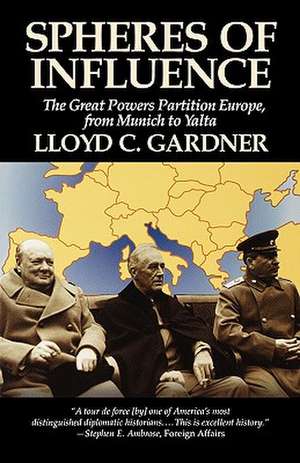Spheres of Influence
Autor Lloyd C. Gardneren Limba Engleză Paperback – 27 ian 1994
Preț: 129.18 lei
Nou
Puncte Express: 194
Preț estimativ în valută:
24.72€ • 25.88$ • 20.45£
24.72€ • 25.88$ • 20.45£
Carte tipărită la comandă
Livrare economică 05-19 aprilie
Preluare comenzi: 021 569.72.76
Specificații
ISBN-13: 9781566630580
ISBN-10: 1566630584
Pagini: 319
Dimensiuni: 141 x 209 x 22 mm
Greutate: 0.45 kg
Ediția:Elephant Pbk.
Editura: Ivan R. Dee Publisher
ISBN-10: 1566630584
Pagini: 319
Dimensiuni: 141 x 209 x 22 mm
Greutate: 0.45 kg
Ediția:Elephant Pbk.
Editura: Ivan R. Dee Publisher
Descriere
A brilliant reinterpretation of the negotiations between Roosevelt, Churchill, and Stalin that divided Europe and laid the foundations for the cold war. Gardner argues that the quest for territorial agreements began at Munich and culminated at Yalta, and that FDR ultimately settled for them to maintain Allied unity in forging the peace. A tour de force [by] one of America's most distinguished diplomatic historians....This is excellent history. --Stephen E. Ambrose, Foreign Affairs
Recenzii
Stimulating and provocative...anyone who wishes to understand the origins of the Cold War will profit from this account.--Joseph S. Nye Jr. "The New York Times "
Notă biografică
Textul de pe ultima copertă
The war within the war was the struggle among Roosevelt, Churchill, and Stalin for the shape of the world that would follow World War II. That delicate diplomacy is traced and analyzed in Lloyd Gardner's brilliant reinterpretation of the negotiations that partitioned Europe and laid the foundations of the cold war. Mr. Gardner begins his story not conventionally in 1941 but with the British attempt to appease Hitler at Munich in 1938. There, he argues, just as after the war at Yalta, the great powers were concerned to avoid a catastrophic war. There were the roots of the territorial agreements that culminated at Yalta - the "spheres of influence" which the Americans sought to avoid as an Old World curse on the possibilities of a freer and more liberal world economy. Using the most recently opened sources, including information from Soviet archives, Mr. Gardner captures the heady atmosphere of these momentous events in deft glimpses of the major personalities and a persuasive analysis of the course of diplomacy. He notes the consistency of Stalin's aims, the opportunism of Churchill for empire, the dilemma of Franklin Roosevelt. For historians, no one's motives have been more puzzling than FDR's. The president yearned to avoid the partition of Europe that his allies wanted, Mr. Gardner concludes, but ultimately he settled for it in the hope of keeping the Big Three together to make a more lasting peace. Playing for time, FDR ran out of it. The result was a divided Europe and the cold war - which the author suggests may have been preferable to an unstable Europe or World War III.















